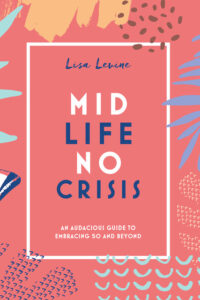Mid Life No Crisis by Lisa Levine (Book Excerpt)
 Other People and Their Opinions
Other People and Their Opinions
Remember trying desperately to fit in at high school? Spending hours pondering whether or not you were cool? Or funny? Or smart? Or pretty? Back then, we were caught up trying to evolve in a fishbowl full of judgy peers and social norms. Yet even now, many of us still fret about what others think of us, from our boss or our kids to the random person in the grocery store. The desire to be accepted is so innate that it can supersede rational thinking and influence all kinds of decisions.
Perhaps you are one of those lucky women who has always marched to the beat of your own drummer. If so, I admire the heck out you. But for the majority of us, the increase of social media can make it a challenge to keep our eyes on our own papers so to speak—especially as we reach midlife. Once again, we may be questioning our place in the greater scheme of things, especially when everyone’s picture-perfect lives can open up our own feelings of “compare and despair.”
Why does it seem that everyone else is always on stunning vacations? Or lifting a mimosa at brunch with an attractive group of friends? Why am I the only one stuck alone in my dusty house, thinking I should really vacuum? I don’t even know where my bathing suit is, let alone if it still fits me!
First off, remind yourself that most people only post the best pictures of the best moments of their lives. How many photos have you seen of someone cleaning the bathroom or lying on the couch eating doughnut holes? If you feel jealous, ask yourself what do you want that they seem to have? Maybe it will be the motivation you need to make a plan. But spending your precious time in the land of compare and despair will get you nowhere but cranky.
Turn your FOMO into JOMO, aka the joy of missing out, or, more specifically, being ok with who and where you are in the present moment. It’s about turning down the noise in your mind, telling those “shoulds” to take a hike, deciding to quit worrying that you’re somehow doing something wrong, and “stop fretting over how your life looks to your Facebook friends.
Keep in mind that we have zero control over what other people think of us (if they are even thinking of us at all). There will always be people who totally get you and people who don’t. When you stop catering to the latter group, it can feel incredibly liberating, if a little scary. All we can do is show up in the world as authentically as possible and be 100% ourselves. It’s true that the more you put yourself out in the world, the more people might judge you. But who are these people to you? And do their opinions actually matter?
Reaching midlife reminds us that our time is valuable and worth protecting. You have choices and you can choose to reserve time for things that bring you joy and help you thrive. This is the perfect opportunity to learn that saying “no” can be a powerful form of self-care! Declining a social event because you want to hang with your cat is fine if that’s what you really want to do, no matter how it looks on social media. Same with deciding to color or not color your hair, wearing a fun outfit that makes you happy, or following your dream to become a marathoner.
In the midst of it all, practice self-compassion.
That “need to fit in” has been a companion for the last 30 or so years, so it’s normal to keep falling into old thought patterns. Be gentle with yourself, stay in your lane, and keep moving forward. The only thing that matters is what you think about yourself and the only thoughts you can control are your own (cue the sound of angels singing). When you spend a majority of your time and energy worrying about how something looks, you forget how it makes you feel. And that’s what is truly important.
Treat Yourself Like Your Own Best Friend
In case you haven’t heard, it’s cool to be kind—and that includes being kind to yourself. Many of us believe that being hard on ourselves will motivate us to change. But it turns out that when we’re feeling stuck or sad, self-compassion is far more effective than self-flagellation. In fact, studies show that people who have compassion for themselves are happier and less pessimistic in their lives in general. This can be highly relevant if you’re struggling with the idea of aging.
When we make a mistake, we often berate ourselves with words we wouldn’t even consider saying to another living soul. If shaming ourselves actually worked, then the whole diet industry would be out of business! As self-help author Louise Hay wrote, “You’ve been criticizing yourself for years and it hasn’t worked. Try approving of yourself and see what happens.”
Self-compassion is not about being self-indulgent or unmotivated. It’s about developing an unconditional attitude of care, kindness, and acceptance for oneself based on the fact that we’re all human and we all make mistakes, large and small. It’s about giving ourselves comfort and understanding instead of criticism and judgment. This can feel like a tall order for women who have been raised on an endless cycle of not good enough, thin enough, successful enough, or just plain enough. Self-compassion is about viewing our situations from a more accepting place, remembering that we’re not meant to be perfect and that, as Ram Das says, “We’re all just walking each other home.”
So how do we address a lifetime of underlying self-smack talk that we’re often not even aware of doing? Begin by noticing the things you say to yourself daily: “That was so stupid,” “Your thighs never look good in jeans” or “Shame on you for saying/doing/eating that!” Now ask yourself, would you say those things to a friend? Or even a stranger?
Next time you feel that somehow you’ve failed or you want to curl up in a ball of shame or despair, remember that what you may be thinking isn’t even necessarily true. In fact, you are a strong and capable woman who has weathered many storms, and you will weather this one as well. Try changing your inner dialogue to something like “I’m feeling bad about myself right now but thinking like this is keeping me stuck in a rut,” or “It’s OK. We all mess up sometimes!”
Then consciously reframe the vibe with some positive thinking. What can you learn from this situation? What have you overcome that is similar? What are some qualities that you feel grateful for or love about yourself? What would your BFF say to you right now and what would you say to her if the roles were reversed?
There’s a ton of studies out there about the power of positivity, but when you’re feeling stressed or down in the dumps, it can seem like a challenge to get to a better place. A simple phrase or mantra can help, like Michelle Obama’s “Am I good enough? Yes, I am.” The more emotion and honesty you feel around what you’re saying, the more power it will have to bring positive change. A mantra might feel uncomfortable or clunky at first but gets easier with practice. Every time you catch yourself internally trash-talking is an opportunity to change the conversation. Remind yourself that this choice was just one decision. There are always opportunities to make different choices in the future.
Practicing good emotional self-care is like the plane metaphor of putting an oxygen mask on yourself first: you can’t help anyone else if you don’t take care of yourself. Self-care can include everything from eating well and regularly moving your body to remembering to take the time to simply pause, breathe, and reflect every day. When you’re tuned in and taking care of yourself, not only will you feel better equipped to handle emergencies big or small, you’ll feel happier and more connected to your life as a whole.
As women, we know about the importance of self-care but we don’t always put it on top of our to-do list. When was the last time you asked yourself what “treats” would satisfy your essential self? Maybe instead of an indulgent dessert, we redefine treats as moments we give ourselves that renew our sense of possibility and excitement? It could be an art exhibit or a drink with friends or an interesting podcast. Maybe it’s setting a strict no-email policy after work or taking a staycation day. Get a houseplant, light some candles, take the bubbliest of bubble baths, and give yourself full permission to celebrate the little things as well as the big ones. Treat yourself exactly like you want to be treated and you’ll be happier—I promise!

For information on Lisa and the book, visit The Audacious Life (audaciouswellness.com).
Tags: aging, later motherhood, midlife no crisis, over 40, over 50















